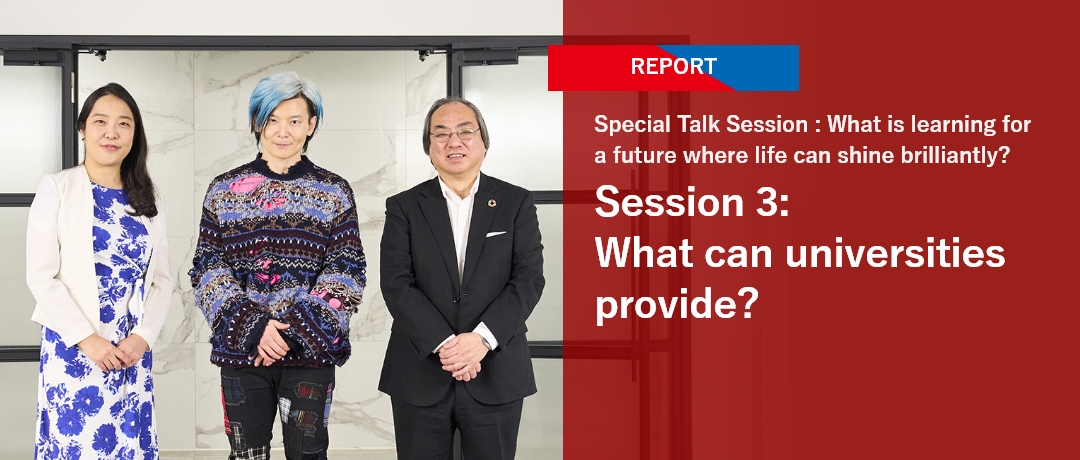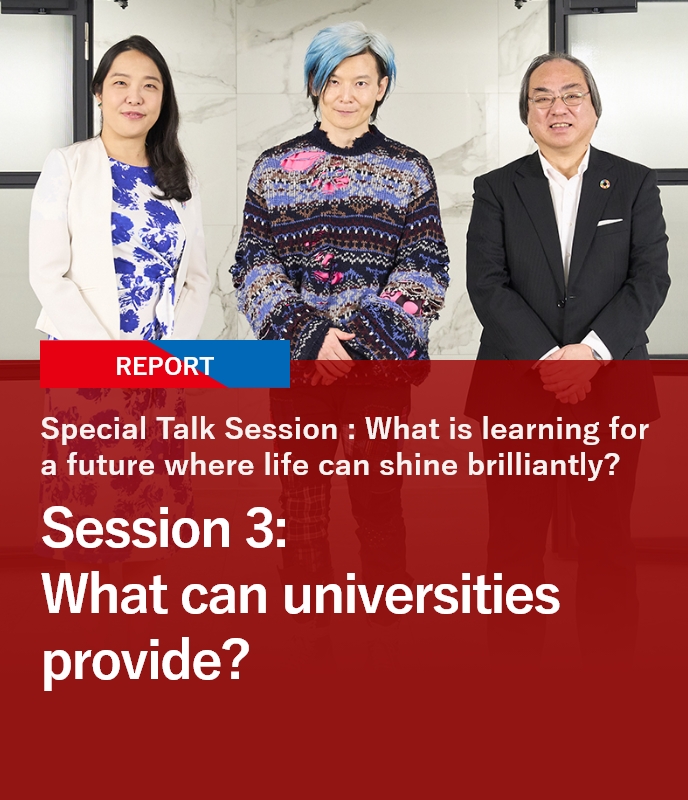The theme of World Expo Osaka-Kansai 2025 is “Designing Future Society for Our Lives.” What shape should the learning we provide to the young people who will become our future leaders take? As a Thematic Project Producer for World Expo Osaka-Kansai as well as an educator, mathematician, and musician, Sachiko Nakajima wears many hats. She served as the navigator for this expert talk session on the topic of learning for a future where life can shine brilliantly. In the third installment of the series, Hiroaki Miyata, who like Nakajima is also a Thematic Project Producer for World Expo Osaka-Kansai, and Yoshio Nakatani, the President of Ritsumeikan University, discussed the topic of what can universities provide.
Profile
Sachiko Nakajima
Nakajima earned her bachelor’s degree from the Department of Mathematics of the School of Science at the University of Tokyo. In her second year of high school, she became the first Japanese woman to win a gold medal at the International Mathematical Olympiad. She took a liking to piano and composition at an early age and began her music career in earnest during university. In 2017, she founded steAm Inc. to promote the widespread adoption of STEAM education. She serves as the Producer for the “Invigorating Lives” Thematic Project of World Expo Osaka-Kansai 2025.
Hiroaki Miyata
Miyata earned his master's degree from the Division of Health Sciences and Nursing in the Graduate School of Medicine at the University of Tokyo in 2003. He conducts research activities to improve reality by attempting to transform society using data science and other kinds of science. He is a Professor in the Health Policy and Management Division of the School of Medicine at Keio University. He serves as the Producer for the “Resonance of Lives” Thematic Project of World Expo Osaka-Kansai 2025.
Yoshio Nakatani
Nakatani earned his bachelor’s degree from the School of Human Sciences at Osaka University. After working as a researcher for an electrical equipment manufacturer, he has spent 20 years conducting research and development concerning artificial intelligence and the relationship between AI and humans. In 2004, he was appointed as Professor in the College of Information Science and Engineering at Ritsumeikan University. After serving as the Dean of the College of Information Science and Engineering and Vice Chancellor of the Ritsumeikan Trust, he was elected Chancellor of the Ritsumeikan Trust and President of Ritsumeikan University in 2019. His areas of expertise include cognitive engineering and human interfaces.
How can each individual “shine brilliantly” in harmony with society?
Nakajima: What do you two think about, “the brilliance of life, the key phrase for World Expo Osaka-Kansai?
Miyata: This is my own view, but the most important issue of the Sustainable Development Goals (SDGs) is human security, a topic that was proposed even before the SDGs were announced. We are where we are today because we have built up values that aim to “keep the light of life burning,” values that I believe the whole world can agree on. This is no longer enough to keep us moving forward, however. What should we do to not only keep the light of life burning, but to ensure that it can shine brilliantly? I think we have reached a point in time where we need to think about this question.
Nakajima: So, you are saying the basic premise is that there is a “light of life,” but the question is how to make it shine brilliantly?
Miyata: That's right. How can the wellbeing and diversity of each individual shine through in harmony with society? I think this is also an important element in learning.
Nakatani: It is difficult for any one person to “shine” on their own. I think this is something that can be achieved by interacting with other people. As someone who manages a university, every day, I feel that it is important to create places where each individual can shine in their own way and where they can gain insights.
Nakajima: When I talk to people who work in school education, I often hear the term “individually optimized learning.”
Nakatani: After working on artificial intelligence research in the private sector, I continued my research in the field of information engineering as it pertains to disaster prevention. During this process, I realized that memories are what form the basis of a person’s personality. Therefore, losing mementos in a disaster is a very painful experience, as it is tantamount to a loss of identity. Based on this, I conceived the field of "personal memory engineering" to use computers to create information that serves as an alternative to mementos and to share this with the community.
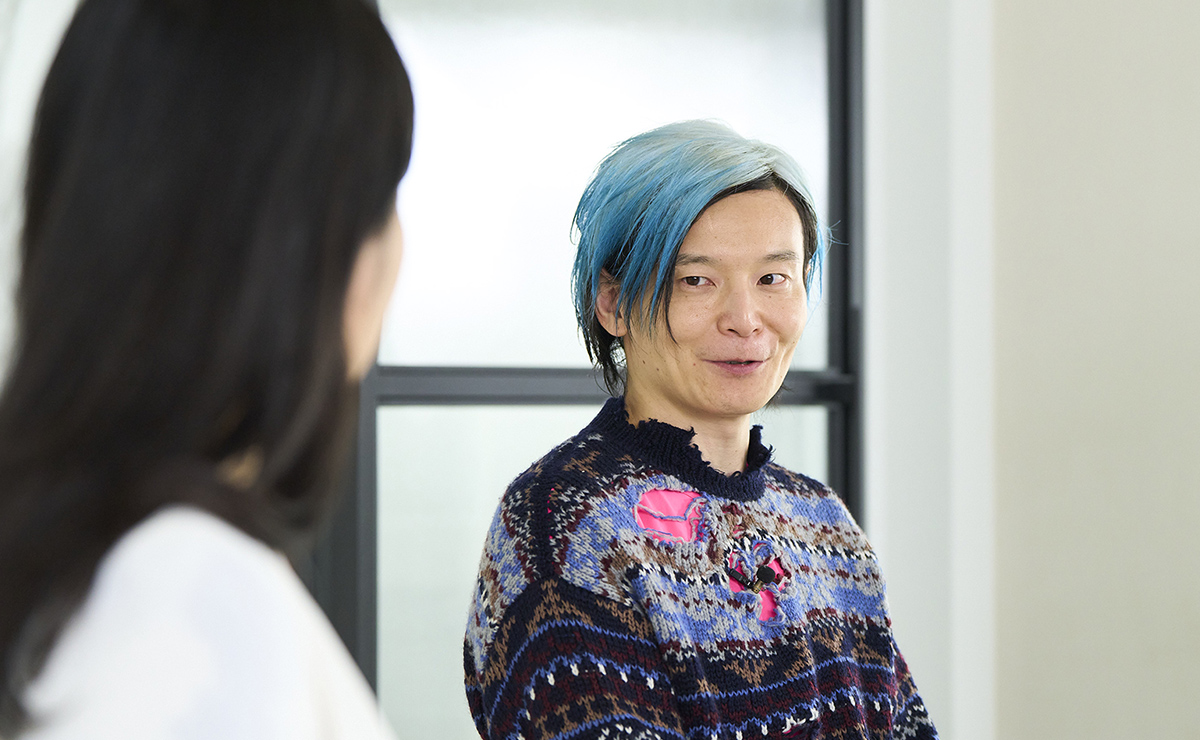
The ability to ask questions: An important skill in the age of AI
Miyata: As in the case of personal memory engineering, we now live in an era in which science and technology has the power to guide us to solutions to difficult problems. So, what is important in terms of interpersonal relationships and the relationship between people and society? And what can science do to answer philosophical questions like this? This is also an important research topic for me, personally. The digital revolution has changed the way society functions. In the past, the industrial society model was dominant, where everyone learned the same knowledge and skills in their youth and then applied them to a social framework to benefit society; however, generative AI not only acquires knowledge, it can also solve problems. So, what role is left for humans? I think it is the ability to ask questions.
Nakajima: Yes, asking questions is the most important part of learning. First and foremost, university research is a process of inquiry guided by asking questions.
Nakatani: Fundamental questions arise from the act of living, so this is something that generative AI cannot do. Even if AI can pose pseudo-questions, the fundamental questions of life are similar to philosophy, and they require a process of looking into the future and looking backwards to rethink the past. I believe another role of universities is to provide students with opportunities and time to do just that.
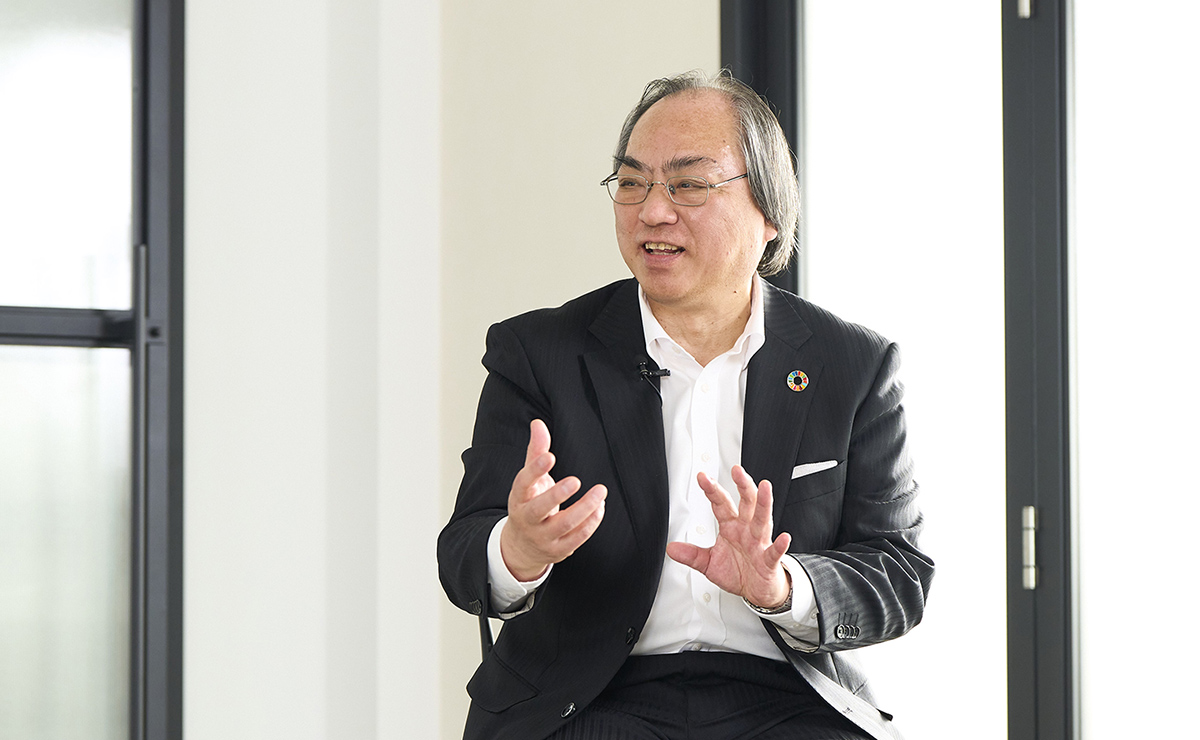
Failure is part of the journey: Creating an environment where people are free to try new things
Nakajima: Another role of universities is to serve as an intellectual hub. A university is a place for collaboration and co-creation with junior high schools, high schools, the community, and various kinds of companies.
Miyata: I am currently working on creating a university in Hida-Takayama in Gifu Prefecture. It will be like a start-up company in academia, and we aim to open in 2026. We have tentatively named it Co-Innovation University (with the application to MEXT scheduled for October 2024) as it will be a university that does not confine itself to academia, but cooperates with a wide range of other organizations to create the future in a practical manner.
Nakajima: It will truly be a place of co-creation. What is Ritsumeikan doing?
Nakatani: The Ritsumeikan Academy comprises one primary school, four junior high schools, four high schools, and two universities that include graduate schools. We are now planning to build a platform to support entrepreneurship as a theme that runs from the primary school all the way to the graduate school level, under the banner of "next-generation inquiry-based learning academy".
Miyata: That is excellent.
Nakatani: I think, however, that an environment in which students can freely try new things is necessary for inquiry-based learning. Therefore, we positioned the Osaka Ibaraki Campus (OIC), where the College of Information Science and Engineering and the College of Image Arts and Sciences will relocate this April, as a "Try Field," a testing ground for the creation of myriad ideas.
Nakajima: When you try new things, failure is part of the journey. Letting students know that it’s okay to fail is an attractive feature.
Nakatani: OIC's philosophy is to be an open campus, so there are no gates or walls, and citizens can come and go as they please.
Miyata: That sounds like our Co-being Pavilion. We, too, pursued the concept of people connecting and spreading out, and we ended up with a pavilion with no walls and no ceiling.
Nakatani: I think the Expo itself should be as open as possible. The venue is just a base of operations, so if the entire Kansai region could become a "Try Field,” it would be very exciting.
Nakajima: Yes, because the concept of the Expo is "a testing ground for the future.”
Dealing with questions that have no right answers and increasing creativity
Nakajima: We named our pavilion “The Playground of Life: Jellyfish Pavilion.” This is because we thought that unstructured play is necessary to foster creativity. We don't know what the right answer is, and there is no single answer. It is like drifting aimlessly and learning as you go.
Miyata: Right now, we are also working on an interactive learning project that incorporates art into learning. We want people to appreciate art and freely express their opinions to each other. Because it is art, of course, there are no right answers. I feel that confronting the elusive is a very good learning experience, as it helps to cultivate the ability to ask questions.
Nakatani: You mentioned philosophy earlier, and philosophy is a typical example of this. Something emerges when you are in a passive state rather than when you are consciously trying to think. This is usually the same way engineers come up with ideas. While it is important to think deeply about ideas in a linear fashion with your eye on a goal, I think it is also very good in terms of creativity to create a state where you can let your brain play around on its own.
Miyata: This is also a common thread in the STEAM education*1 that Nakajima is involved in.
Nakajima: Indeed. The idea is that whether you are learning engineering, math, science, or technology, it is important to study the "A", that is, art and liberal arts, to gain a multifaceted perspective.
*1: STEAM education is a method of learning that engages students in using creative thinking to come up with questions and solve problems by studying Science, Technology, Engineering, the Arts, and Mathematics in a cross-disciplinary manner.
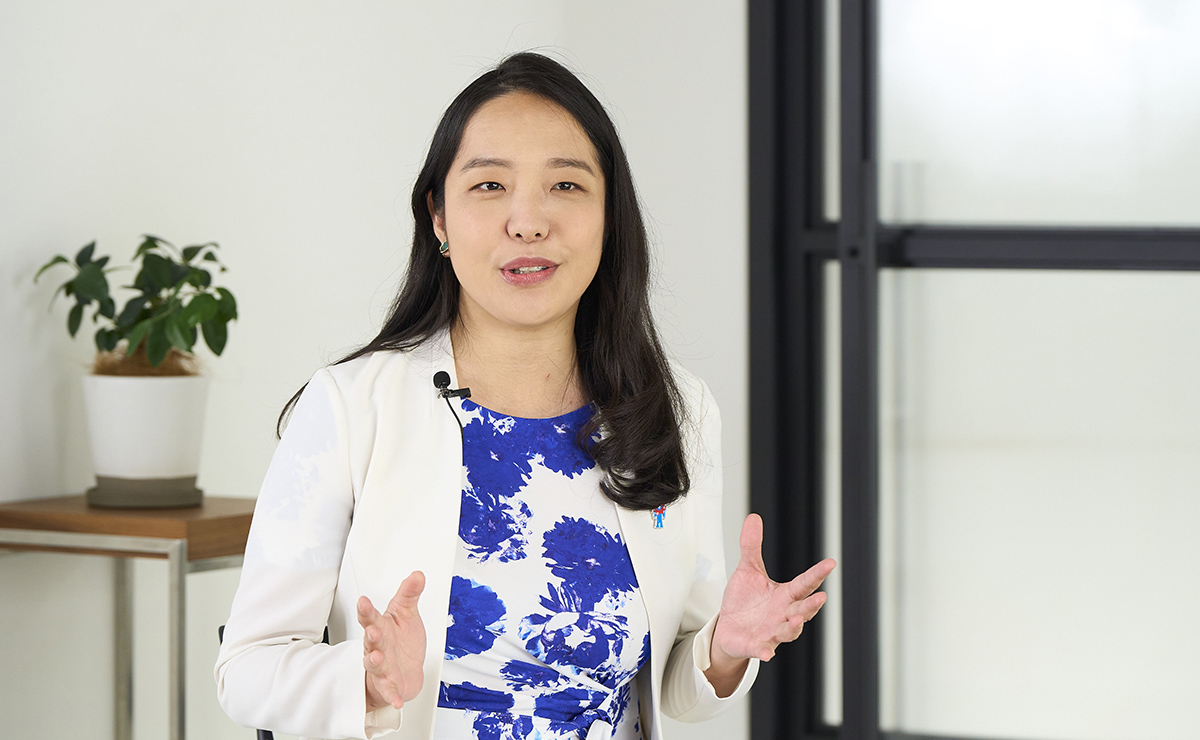
Bringing a diverse array of values in contact with the five senses
Co-creating the society of the future
Nakajima: In terms of providing encounters with different values, Ritsumeikan is also actively involved in international exchange, isn't it?
Nakatani: Yes, that’s right. This is true not only for Ritsumeikan Asia Pacific University (APU), where international students make up half of the student body, but also for Ritsumeikan University, which has over 2,600 international students. However, some questions remain as to what extent Japanese students are actually connecting with international students and connecting with opportunities to learn about the world. This is why I am looking forward to the Expo, where people from various countries will gather in one place, as it is a chance to truly encounter different cultures.
Miyata: With the development of the internet, we are now connected to the world, but one issue we now face is the echo chamber phenomenon.*2 The online space appears to be connected to the wider world, but in fact, it is easy to get stuck in places or with information that is comfortable for you. Although it may seem that you are being exposed to new information, it’s not new at all. Therefore, the Expo will be a great opportunity for people to experience the diversity of values in a real world setting with all five senses. We hope that everyone will encounter many different things and gain firsthand exposure to new values.
Nakatani: The same applies to universities. I would like the Expo to be a place where people can interact with a wide range of different things and get excited— a place where anyone can stop by, meet and talk to other people, and then say “let's do this together” with an eye on the future. I sincerely hope this is what the Expo will be like.
Nakajima: We often use the word “swizzle stick” in the Jellyfish Pavilion, and I hope the Expo can play a role in stirring things up! We hope to meet all kinds of people, get them involved, and work together to come up with a new social model.
*2: A phenomenon in which people connect with others who have similar interests to their own via social media and other means, and their thinking becomes more extreme as a result of only being exposed to the same values and ideas.
